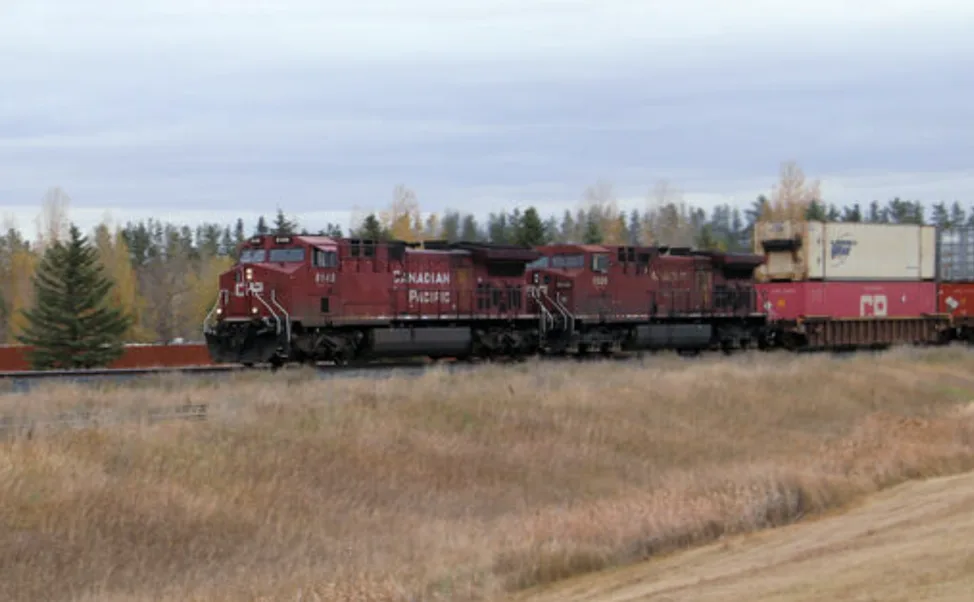
Tonnes of Prairie grain stuck on trains after B.C. flooding cuts off rail lines
Floods in British Columbia have dealt another blow to grain farmers in Manitoba already struggling with a small crop due to severe drought earlier this year.
"From a natural disaster point of view, as it affects rail logistics, we haven't seen anything of this magnitude," said Wade Sobkowich, executive director of the Western Grain Elevator Association.
The grain transportation system is vulnerable because there are not many passes through the mountains in B.C., and both the Canadian National and Canadian Pacific railways have been cut off due to the flooding.
Sobkowich says there are about 100,000 tonnes of grain sitting in rail cars that can't pass through.

RELATED: How B.C.'s catastrophic rainfall, flooding was foretold days before
"This definitely is the most significant and probably the most costly natural disaster that we can recall in our collective memory," he said.
This is peak shipping season for farmers whose grain normally travels by rail through the Fraser Valley in B.C. to the port of Vancouver, said Barry Prentice, a professor of supply chain management at the University of Manitoba.
"It's already a short crop, so the grain handlers are really going to be affected. Farmers are getting good prices so they might not be that worried, but I think the handling system is the big part that's going to hurt."
On Tuesday, the Port of Vancouver confirmed all rail traffic in and out of the Port of Vancouver had been halted and said a timeframe for reopening of the rail lines will be known once damage assessments are complete.
RELATED: Thousands of animals have died on flooded B.C. farms in 'agricultural disaster'
There is some room to store grain in the short term, as well as capacity on the trains, due to the short crop this year. Elevators are about 75 per cent full, after farmers harvested about 48 million tonnes of grain this year, compared 70-75 million tonnes in a normal year, Sobkowich said.
The storage capacity won't last if the delay drags on longer than a week, he said.
Farmers could face penalties if ships are stuck in Vancouver waiting for the grain to arrive.
WATCH BELOW: BARGE WASHED UP ON VANCOUVER’S SUNSET BEACH WON’T BE MOVED UNTIL SUNDAY
CONSUMERS MIGHT NOT FEEL PINCH YET
Manitoba consumers might not feel the effects of the delay in terms of the delivery of goods, at least not immediately, although insurance rates could increase in the future, Prentice said.
Munther Zeid, who owns the Food Fare chain of grocery stores in Winnipeg, says it's too early to tell if there will be supply shortages as a result of the floods in B.C.
"Things seem to be pretty much still flowing," he said on Wednesday in an interview with Faith Fundal on CBC Manitoba's afternoon radio show, Up to Speed.
"Some things might get interrupted for a week, maybe two, if that. They are working hard to make sure it doesn't."
Disruptions to the transportation system are especially costly to those working in the supply chain because once the opportunity is missed, those costs can't be recovered, Prentice said.
"The trucker who's stuck for four days, he can't get that money back. You can't stockpile transport, it's a very perishable item," he said.
The flooding comes after severe wildfires in B.C. earlier this year caused transportation delays. Farmers and transportation companies may start to look for other markets to the east, through Thunder Bay, or south to the United States, which would be less vulnerable, Sobkowich said.
This article was originally published for CBC News on Nov. 18. Contains files from Marianne Klowak, Cameron MacLean and Aviva Jacob.
Thumbnail image credit: File photo/UGC/Dan Loran